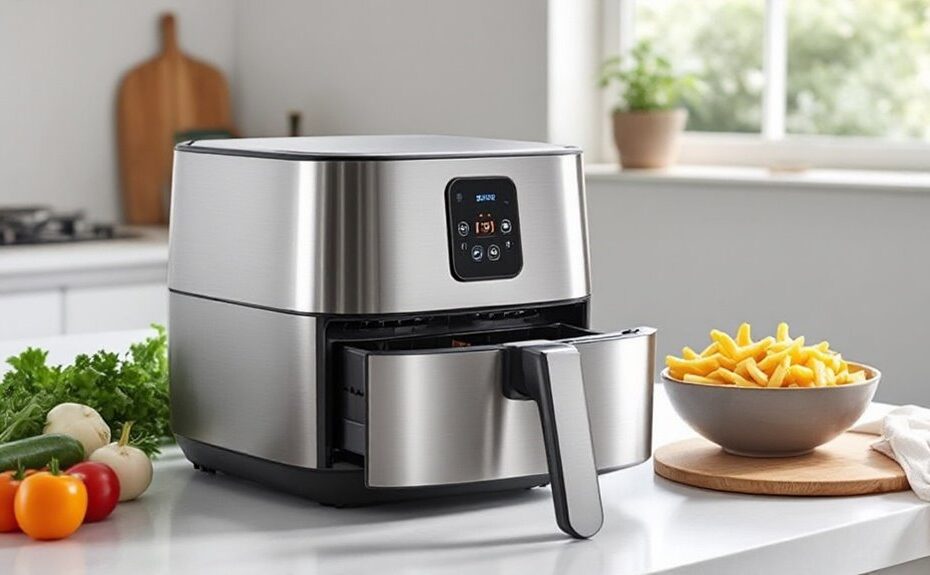You might wonder how long your air fryer will last before it needs replacing. On average, you can expect it to serve you well for 3 to 5 years, but this depends on how often you use it, how well you maintain it, and the quality of its build. High-end models with durable materials often outlast cheaper alternatives, but even the best air fryer can falter if neglected. What signs should you watch for to know when it's time for an upgrade? The answer lies in understanding the factors that influence its lifespan—and how you can make yours last longer.
Key Takeaways
- The average lifespan of an air fryer is 3 to 5 years with regular use and proper maintenance.
- Higher-end models with durable materials like stainless steel can last 5 years or more.
- Budget air fryers may have a shorter lifespan of 1 to 3 years due to lower-quality components.
- Regular cleaning, avoiding overloading, and following manufacturer guidelines can extend the lifespan.
- Signs of replacement include decreased performance, visible wear, or safety concerns like cracks or overheating.
Factors Affecting Air Fryer Lifespan
The lifespan of an air fryer depends on several key factors, including usage frequency, maintenance practices, and build quality. Material durability plays a critical role; models with stainless steel or high-grade plastic components tend to outlast those with cheaper materials. Temperature consistency is another essential factor—units with precise thermostats and even heat distribution experience less strain on internal components, prolonging their life. How often you use your air fryer also impacts its longevity; daily use accelerates wear compared to occasional use. Proper maintenance, like regular cleaning and avoiding overloading, prevents buildup and overheating. Additionally, following the manufacturer's guidelines for operation and care guarantees peak performance. By prioritizing these factors, you can maximize your air fryer's lifespan and maintain its efficiency over time.
Typical Lifespan Range of Air Fryers
While the lifespan of an air fryer can vary based on usage and care, most models typically last between 3 to 5 years with regular use. Lifespan statistics indicate that higher-end models with robust build quality often reach the upper end of this range, while budget options may fall closer to 3 years. Durability trends show that air fryers with stainless steel components or ceramic-coated baskets tend to outperform those with less durable materials. To maximize longevity, you should follow the manufacturer's maintenance guidelines, such as avoiding overheating and cleaning components properly. While some units may last beyond 5 years, consistent daily use or improper handling can shorten their lifespan. Understanding these durability trends helps you set realistic expectations for your appliance's performance over time.
Signs Your Air Fryer Needs Replacement
If your air fryer takes considerably longer to cook food or produces uneven results, it's likely experiencing decreased cooking performance. Visible wear, such as cracked handles, peeling coatings, or damaged heating elements, also signals it's time for a replacement. Ignoring these signs can compromise both safety and efficiency.
Decreased Cooking Performance
As your air fryer ages, you might notice it's no longer delivering the same crisp, evenly cooked results it once did. Cooking temperature fluctuations can cause inconsistent heating, leading to undercooked or overcooked meals. Uneven food browning is another telltale sign, where some areas of your food are perfectly golden while others remain pale or burnt. These issues often stem from worn-out heating elements or a malfunctioning thermostat, which struggle to maintain consistent performance over time. If you've recalibrated cooking times and temperatures without improvement, it's likely your air fryer's internal components are deteriorating. Persistent performance decline not only affects meal quality but also increases energy consumption. When these problems become frequent, it's a clear indicator that your air fryer may need replacement to restore peak cooking efficiency.
Visible Wear and Damage
Over time, your air fryer may show visible signs of wear and damage that signal it's nearing the end of its lifespan. Surface scratches on the exterior or interior basket can accumulate, potentially affecting non-stick coatings and leading to uneven cooking. Cosmetic dents, while often harmless, may indicate internal damage if they impact the heating element or airflow system. Cracks in the housing or basket can compromise safety and efficiency, as they may allow heat to escape or expose electrical components. If you notice peeling coatings, warped parts, or rust, these are clear indicators that replacement is necessary. Regularly inspect your air fryer for these issues, as addressing them early can prevent further deterioration and guarantee consistent performance.
How Usage Frequency Impacts Durability
Daily use accelerates wear on your air fryer's heating elements and non-stick coating, reducing its lifespan. Occasional use, on the other hand, extends durability by minimizing stress on internal components. Regular maintenance, like cleaning after each use, further preserves functionality regardless of usage frequency.
Daily Use Wear
Frequent use of an air fryer accelerates wear on its components, particularly the heating element, fan, and non-stick coating. Daily cleaning habits play a critical role in maintaining its longevity; residue buildup can degrade the heating element and fan efficiency over time. Use non-abrasive tools and mild detergents to preserve the non-stick surface. Cooking duration impact is another key factor—prolonged high-temperature cycles strain the heating element and motor. To minimize wear, avoid running the appliance continuously for extended periods. Instead, break tasks into shorter cycles when possible. Regularly inspect the fan for debris and guarantee proper airflow to prevent overheating. By balancing usage frequency with proper maintenance, you can mitigate daily wear and extend your air fryer's lifespan substantially.
Occasional Use Longevity
When an air fryer is used occasionally rather than daily, its components experience less stress, which can markedly enhance its durability. Reduced usage minimizes wear on heating elements, fans, and non-stick coatings, extending the appliance's lifespan. However, proper storage conditions are critical to maintaining its longevity. Store your air fryer in a cool, dry place to prevent moisture damage or overheating. Cleaning habits also play a significant role; make sure you clean the basket and interior after each use to avoid grease buildup, which can degrade materials over time. Even with infrequent use, neglecting these practices can lead to premature failure. By combining occasional use with diligent care, you can maximize your air fryer's lifespan and maintain its performance for years.
Maintenance Frequency Effects
Although air fryers are designed for regular use, how often you maintain them directly influences their durability. Establishing consistent cleaning schedules prevents grease buildup, which can degrade heating elements and fans over time. After each use, wipe down the basket and interior to avoid residue accumulation. Deep clean the removable parts weekly using warm, soapy water to sustain peak performance. For mechanical components like hinges or moving parts, periodic component lubrication guarantees smooth operation and reduces wear. Avoid harsh chemicals that could damage non-stick coatings or seals. Regular maintenance not only extends the lifespan but also guarantees consistent cooking results. Neglecting these practices can lead to overheating, reduced efficiency, or premature failure. By prioritizing upkeep, you'll maximize your air fryer's longevity and performance.
The Role of Maintenance in Longevity
Proper maintenance greatly extends the lifespan of an air fryer by preventing wear and guaranteeing peak performance. Establish consistent cleaning routines to remove grease and food residue, which can degrade components over time. After each use, wipe the basket, tray, and interior with a damp cloth, and deep-clean weekly using mild detergent. Inspect components like the heating element and fan for debris or damage, as blockages can strain the motor and reduce efficiency. Check seals and gaskets for wear to maintain proper airflow and temperature control. Avoid harsh chemicals or abrasive tools that could damage non-stick coatings. Regular maintenance not only prevents malfunctions but also secures consistent cooking results. By prioritizing these practices, you'll maximize your air fryer's longevity and performance.
Comparing Build Quality Across Brands
Since build quality directly impacts an air fryer's durability and performance, it's essential to evaluate materials and construction across brands. High-end models often use stainless steel or heavy-duty plastics, which enhance brand durability and resist wear. Mid-range options may feature thinner plastics or lower-grade metals, potentially compromising longevity. When conducting a material comparison, prioritize models with reinforced hinges, sturdy baskets, and heat-resistant coatings, as these components endure frequent use. Brands like Philips and Ninja are known for robust builds, while budget options may cut corners on material quality. Check for certifications like BPA-free plastics or food-grade coatings to guarantee safety and durability. A well-constructed air fryer not only lasts longer but also maintains consistent cooking performance, making material and build quality key factors in your decision.
Common Air Fryer Malfunctions Over Time
Over time, even the most durable air fryers can experience malfunctions due to wear and tear or improper use. Power surges are a common issue, damaging internal components like the heating element or control board. To mitigate this, use a surge protector. Overheating issues often arise from blocked vents or excessive use, causing the fryer to shut off unexpectedly. Guarantee proper airflow by keeping vents clean and avoiding overloading the basket. Faulty temperature sensors can lead to inconsistent cooking, while worn-out seals may reduce efficiency. Regularly inspect these parts and replace them if necessary. Avoid using abrasive cleaners, as they can damage non-stick coatings, leading to uneven heating. Addressing these malfunctions promptly can prolong your air fryer's functionality.
Tips to Extend Your Air Fryer's Life
To maximize your air fryer's lifespan, you'll want to adopt consistent maintenance habits and mindful usage practices. Start with proper cleaning techniques: wipe the exterior after each use, remove and wash the basket and tray with warm, soapy water, and make sure no food debris clogs the heating element. Avoid overheating issues by not overloading the basket, which restricts airflow and strains the appliance. Always preheat the air fryer before cooking to reduce stress on the heating mechanism. Use non-abrasive tools to prevent scratching surfaces, and never immerse the main unit in water. Regularly inspect the power cord and plug for damage. By following these steps, you'll maintain peak performance and extend your air fryer's longevity.
When to Consider Upgrading Your Air Fryer
If your air fryer's performance has noticeably declined despite proper maintenance, it might be time to contemplate an upgrade. Key replacement indicators include inconsistent cooking results, longer cooking times, or unusual noises during operation. If the heating element struggles to maintain temperature or the fan malfunctions, these are clear signs of wear. Upgrade timing also depends on technological advancements; newer models often feature improved efficiency, larger capacities, or smart controls. If repairs cost more than half the price of a new unit, investing in a replacement is more practical. Additionally, consider upgrading if your current model no longer meets your cooking needs or lacks safety features. Regularly assess your air fryer's condition to guarantee it aligns with your expectations and modern standards.
Disclosure: As an Amazon Associate, I earn from qualifying purchases.



